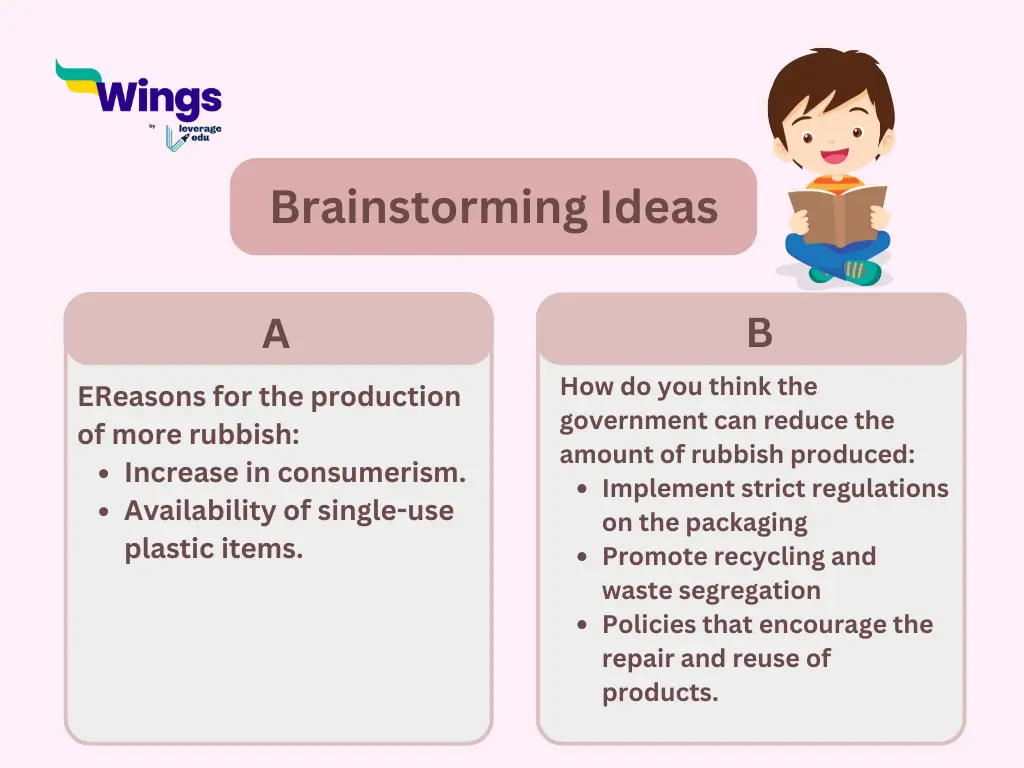Brainstorming ideas:
- Reasons for the production of more rubbish:
- Increase in consumerism.
- Availability of single-use plastic items.
- How do you think the government can reduce the amount of rubbish produced:
- Implement strict regulations on the packaging
- Promote recycling and waste segregation
- Policies that encourage the repair and reuse of products

Q. Nowadays we are producing more and more rubbish. Why do you think this is happening? What can governments do to help reduce the amount of rubbish produced?
Ans. The increase in the amount of rubbish that is being produced in today’s society is a significant environmental concern. There are several reasons for this trend, majorly linked to consumerism, packaging practices, and the disposable culture that has become prevalent in many parts of the world. However, this problem can also be reduced by implementing strict rules and promoting recycling and reusing products.
One of the major reasons for the rise in rubbish production is the increase in consumerism. As people continue to purchase more goods, the amount of waste generated from packaging and discarded products has increased. For instance, because of the popularity of online shopping the usage of cardboard, plastic and bubble wrap has increased, all of which contribute to waste. In addition, the availability of single-use plastic items like plastic bottles and disposable utensils also exacerbates the problem. These products are often used once and are thrown away, adding a significant volume of rubbish.
However, the government can curb this massive rate of rubbish production by implementing suitable measures. One of the effective measures is to implement strict regulations on the packaging. This can be done by encouraging companies on all levels to use biodegradable materials or reduce the amount of packaging used. Another approach is to promote recycling and waste segregation. Furthermore, implementing policies that encourage the repair and reuse of products, rather than disposal, can also help. For instance, offering tax incentives to businesses that provide repair services or produce durable goods can reduce waste.
In conclusion, the growing problem of rubbish production can be attributed to increased consumerism and a disposable culture. However, with proactive measures such as stricter packaging regulations, enhanced recycling programs, and incentives for product durability, governments can significantly reduce the amount of waste produced.
Analysis
Paraphrased Statement: The increase in the amount of rubbish that is being produced in today’s society is a significant environmental concern.
Thesis Statement: There are several reasons for this trend, majorly linked to consumerism, packaging practices, and the disposable culture that has become prevalent in many parts of the world. However, this problem can also be reduced by implementing strict rules and promoting recycling and reusing products.
Body Paragraph 1-Topic Sentences: One of the major reasons for the rise in rubbish production is the increase in consumerism. As people continue to purchase more goods, the amount of waste generated from packaging and discarded products has increased.
Body Paragraph 1- Supporting Reasons and Explanations: For instance, because of the popularity of online shopping the usage of cardboard, plastic and bubble wrap has increased, all of which contribute to waste. In addition, the availability of single-use plastic items like plastic bottles and disposable utensils also exacerbates the problem. These products are often used once and are thrown away, adding a significant volume of rubbish.
Body Paragraph 2- Topic sentence: However, the government can curb this massive rate of rubbish production by implementing suitable measures. One of the effective measures is to implement strict regulations on the packaging.
Body paragraph 2- Supporting Reasons and Explanations: This can be done by encouraging companies on all levels to use biodegradable materials or reduce the amount of packaging used. Another approach is to promote recycling and waste segregation. Furthermore, implementing policies that encourage the repair and reuse of products, rather than disposal, can also help. For instance, offering tax incentives to businesses that provide repair services or produce durable goods can reduce waste.
Conclusion: In conclusion, the growing problem of rubbish production can be attributed to increased consumerism and a disposable culture. However, with proactive measures such as stricter packaging regulations, enhanced recycling programs, and incentives for product durability, governments can significantly reduce the amount of waste produced.
Vocabulary in Use
| Word | Meanings |
| Consumerism | Belief in the value of buying goods and services. |
| Discarded | Thrown away as no longer useful. |
| Exacerbates | Makes worse. |
| Attributed | Assigned a cause or origin to something. |
Linkers and Connectors Used:
Following are the linkers and connectors used:
- For instance
- In addition
- For example
- In conclusion
- However
Are you preparing for IELTS? Check out this video to improve your writing skills for the IELTS exam given below👇.
Download the Leverage IELTS App today.


Need help preparing for IELTS? Check out the best IELTS preparation courses in the market offered in a live training environment.


 One app for all your study abroad needs
One app for all your study abroad needs












 60,000+ students trusted us with their dreams. Take the first step today!
60,000+ students trusted us with their dreams. Take the first step today!